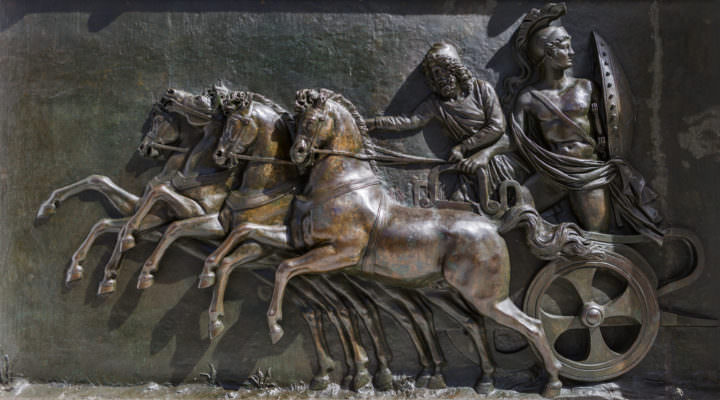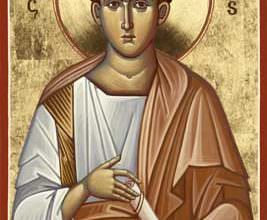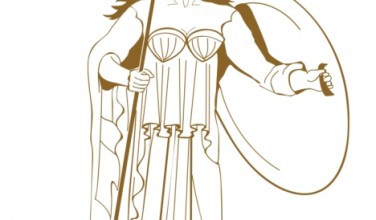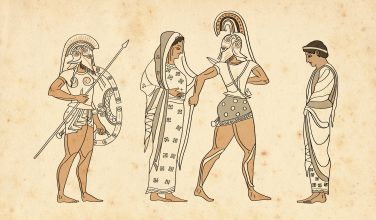All About Cynisca – First Female Olympic Champion of Ancient Greece
Comments Off on All About Cynisca – First Female Olympic Champion of Ancient Greece
 Back in the early days of the Olympic Games in Ancient Greece, it was rare for women to compete, never mind win. However, there are a few well documented examples of women competing. Some, such as Cynicsca, actually won the games. In fact, Cynisca, whose name is also also spelled Kyneska, was the first ever female Olympic champion. Here’s more information about her:
Back in the early days of the Olympic Games in Ancient Greece, it was rare for women to compete, never mind win. However, there are a few well documented examples of women competing. Some, such as Cynicsca, actually won the games. In fact, Cynisca, whose name is also also spelled Kyneska, was the first ever female Olympic champion. Here’s more information about her:
All About Cynisca
Cynisca was born around 440 BC in the Greek city of Sparta, daughter of King Archidamus II, and sister of the future king Agesilaus II. Her name meant ‘female puppy’, a variation of her grandfather’s name, perhaps referring to the female bloodhounds renowned for tracing game by scent. She would live up to that name dramatically in spirit and action.
Being From Sparta Was Significant
At the time, Sparta’s treatment of women differed from the rest of Greece; rather than excluding them from society entirely, women went through rigorous training since the age of six, similar to their warrior brothers, in hopes of preparing them to establish a strong family. Cynisca thrived in this competitive environment. A tomboy from childhood, she was an expert horsewoman, wealthy, and passionate to become the first woman to succeed at the famed Olympic Games, according to the geographer Pausanias.
The Olympics Were Mostly for Men
However, the ancient Olympic Games were dominated by men; women were forbidden to even view the running and combat events at the main Olympia stadium. They could only sponsor the equestrian events from a distance by owning and training the horses, which Cynisca did. She hired men to race her team and won the four-horse chariot competition (“tethrippon” in Greek) in both 396 BC and 392 BC, though ironically, she was probably not allowed to view her own victories.
Cynisca’s Brother Urged Her to Join the Games
But later, her brother Agesilaus II prompted her to join the races personally. His reasons are unknown; he disliked chariot racing, thinking it depended too greatly on the horse owner’s wealth and status instead of physical strength like the other games, and may have been attempting to shame the sport by allowing a woman to join. Or perhaps he was showing off his sister’s talent, or promoting women in society in general. A third opinion says he wanted to reignite the warlike spirit of Spartan men, who had given away ground for the sake of Olympic victories.
Cynisca’s Victory Made Her Popular
Whatever the cause, Cynisca emerged a popular victor. Bronze statues of a horse and chariot, a charioteer, and herself were placed in the Temple of Zeus in Olympia, with the inscription:
“Kings of Sparta are my father and brothers
Kyniska, victorious with a chariot of swift-footed horses,
Have erected this statue. I declare myself the only woman
In all Hellas to have won this crown.
Apelleas son of Kallikles made it.”
The inscription is in the first person and is an indicator of Cymisca’s independence and willingness to push herself forward, though the writer Xenophon claims it was Agesilaus’ idea. Also, Cynisca received a hero-shrine in Sparta at Plane-tree Grove. This was a significant honor; the place was reserved for religious ceremonies, and only Spartan kings were remembered in this way, and never a woman.
Cynisca’s success paved the way for many other female athletes, notably Euryleonis, Belistiche, Zeuxo, Encrateia and Hermione, Timareta, Theodota, and Cassia, though none received the same level of recognition. Cynisca is perhaps best remembered in the words of the Greek writer Zoe Karelli, who immortalized her love for horses and sport in poetry.
Categorized in: Ancient Greek History
This post was written by Greek Boston
Share this Greek History Article:





